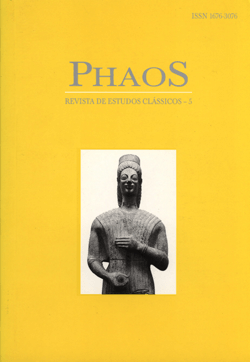Forma e retórica no hino a Zeus do Agamêmnon de Ésquilo
Palavras-chave:
Aeschylus. Agamemnon. Hymn to Zeus. Rhetoric. Hymn. Victory ode.Resumo
In the parodos os Aeschylus' Agamemnon, the so-called Hymn to Zeus stands between the omen of the eagles and Iphigenia's sacrifice. The omen, as interpreted by Calchas, stresses the justice of the Atreidai's expedition but alludes to Iphigenia's sacrifice as a necessary condition to its fulfillment.Weighed down by anguish, the Elders cut shrt the narrative to sing a hymn in praise of Zeus, in the hope of dispelling the dilemma between divine justice and the sacrifice of an innocent. My intention in this paper is to show, by means of an analysis of the conventional aspects of the genre, that the Hymn to Zeus is an authentic hymn, that its purpose is eminently laudatory: to sing the praise pf a deity whose main distinction is to be the winner, and therefore the hymn displays many rhetoric elements of the victory ode.Referências
BEATTIE, J. "Aeschylus, Agamemnon 160-83", CQ5 (1955), pp. 13-20.
BOOTH, N. B. "Zeus Hypsistos Megistos: An Argument for Enclitic που in Aeschylus, Agamemnon 182", CQ26 (1976), pp. 220-8.
BUNDY, E. L. Studia Pindarica, Berkeley, 1986.
BUNDY, E. L. "The 'Quarrel Between Kallimachos and Apollonios' Part 1. The Epilogue of Kallimachos's Hymn to Apollo", CSCA 5 (1972), pp. 39-94.
BURKERT, W. Greek Religion, Cambridge, Mass., 1985.
CLAY, J. S. The Politics of Olympus. Form and Meaning in the Major Homeric Hymns, Princeton, 1989.
COHEN, D., "The Theodicy of Aeschylus: Justice and Tyranny in the Oresteia", G&R 33 (1986), pp. 129-41.
DAWE, R. D., "The Place of Hymn to Zeus in Aeschylus' Agamemnon", Eranos 64 (1966), pp. 1-21.
DOVER, K. J. "Some Neglected Aspects of Agamemnon's Dilemma", JHS 93 (1973), pp. 58-69.
FRAENKEL, E. Aeschylus. Agamemnon, Oxford, 1950, 2 vols.
GANTZ, T. "The Chorus of Aischylos' Agamemnon", HSCP87 (1983), pp. 65-86.
HALDANE, J. A. "Musical Themes and Imagery in Aeschylus", JHS 85 (1965), 33-41.
HAMMOND, N. G. L., "Personal Freedom and its Limitations in the Oresteia", JHS 85 (1965), pp. 42-55.
LESKY, A. "Decision and Responsability in the tragedy of Aeschylus", JHS 86 (1966), pp. 77-85.
LESKY, A. Die tragische Dichlung der Hellenen (Göttingen, 1972).
LLOYD-JONES, H. "Zeus in Aeschylus", JHS 76 (1956), p. 55-67.
NORDEN, E. Agnostos Theos, Leipzig/Berlin, 1929.
PARKER, R. "Pleasing Thighs: Reciprocity in Greek Religion", in C. Gill, N. Postlethwaite e R. Seaford (eds.), Reciprocity in Ancient Greece, Oxford (1998), pp. 105-25.
PELLICCIA, H. "Pindarus Homericus: Pythian 3.1-80", HSCP 91 (1987), pp. 39-63.
POLIAKOFF, M. "The Third Fall in the Oresteia", AJP 101 (1980), pp. 251-9.
POPE, M. "Merciful Heavens?", JHS 94 (1974), pp. 100-13.
RACE, W H. "Aspects of Rhetoric and Form in Greek Hymns", GRBS23 (1982), pp. 5-14.
RACE, W H. "Negative Expressions and Pindaric Poikilia", TAPA 113 (1983), pp. 95-122.
ROSENMEYER, T. G. The Art of Aeschylus, Berkeley, 1982.
RUDHARDT, J. "A propos de l'hymne homérique à Déméter", MH 35 (1978), pp. 1-17.
SCHENKER, D. J. "A Study in Choral Character: Aeschylus, Agamemnon 489-502", TAPA 121 (1991), pp. 63-73.
SEAFORD, R. Reciprocity and Ritual, Oxford (1994).
SLATER, W. J. "Futures in Pindar", CQ 19 (1969), pp. 86-94.
SMITH, P. M. On the Hymn to Zeus in Aeschylus' Agamemnon, American Classical Studies 5, Chico, 1980.
TAPLIN, O. The Stagecraft of Aeschylus, Oxford, 1977.
WEST, M. L. "The Parodos of the Agamemnon", CQ29 (1979), pp. 1-6.
WINNINGTON-INGRAM, R. P. Studies in Aeschylus, Cambridge, 1983.
Downloads
Publicado
Edição
Seção
Licença
Ao se submeterem textos para a PhaoS, seus autores devem estar cientes de que, se aprovados para publicação, a revista terá sobre eles todos os direitos autorais pertinentes. Originais não serão devolvidos.

